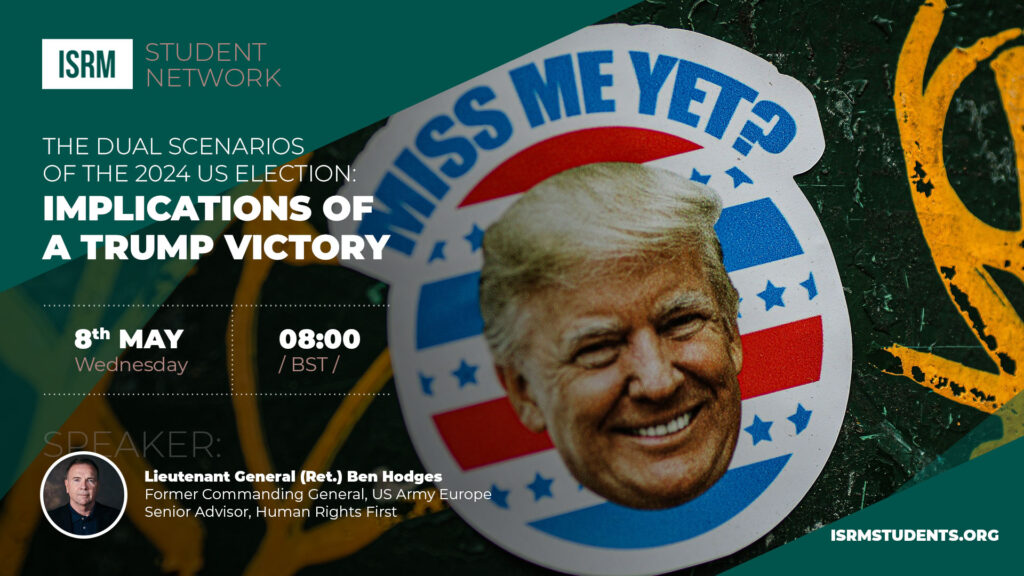The possibility of Donald Trump reclaiming the US presidency in 2024 raises critical questions about the trajectory of American policies, both domestically and on the international stage. Trump’s presidency could profoundly influence the US stance on international conflicts, its relationships with global powers and its role in international organisations.
Trump’s previous term was noted for its unconventional diplomatic approaches, particularly with leaders like Vladimir Putin and Kim Jong Un. A second term might well see a continuation of these relationships, potentially affecting US policies towards Russia in ways that could reshape global alliances and security strategies. As one example, Trump’s seemingly conciliatory approach to Russia could lead to a softening of US policies regarding Ukraine and could impact US support in the ongoing conflict.
Beyond specific bilateral relationships, a Trump presidency is likely to influence broader international relations, particularly with allies in Europe and Asia. His administration’s previous skepticism towards multinational agreements and preference for bilateral deals could again strain relationships with allies and international bodies. Furthermore, Trump’s policies might renew efforts to impose stringent immigration restrictions and dismantle environmental regulations. Economic strategies may once again lean towards “America First” protectionism, potentially exacerbating trade tensions and impacting global market dynamics.
Should Trump lose and refuse to accept the 2024 election results, the repercussions could extend beyond US borders, affecting global perceptions of American democratic stability. Such a scenario could lead to significant national unrest and further undermine public trust in the electoral and judicial systems, as well as weakening US moral authority on the global stage.
In light of the significant global implications that a second Trump presidency could entail, we invite you to join us on the 8th of May at 08:00 BST for the ISRM Student Network Workshop “The Dual Scenarios of the 2024 US Election: Implications of a Trump Victory”.
The workshop will explore the potential shifts in US domestic policies under a second Trump administration, assess the broader impact of Trump’s foreign and trade policies on global stability and US relations with key powers like Russia and China and explore the ramifications of electoral non-acceptance on the integrity of American democracy and its global standing.
We are honoured to have Lieutenant General (Retired) Ben Hodges as our guest speaker, alongside our Executive Director, Dr David Rubens. General Hodges served as Commanding General of United States Army Europe, from November 2014 to January 2018. With his lifetime of involvement in US military and geo-political activities, as well as his specific interest in European security and his insights into NATO operations, General Hodges will offer a unique perspective on the geopolitical implications of the election outcomes.
For professionals and students in the fields of international relations, policy analysis and strategic planning, this event will provide insights into navigating the complex dynamics of global politics. Join us to gain a deeper understanding of how these election outcomes could shape the future geopolitical landscape and influence global policy decisions.
Lieutenant General (Retired) Ben Hodges, the former Commanding General of US Army Europe (2014-2017), currently serves as NATO Senior Mentor for Logistics and is a Distinguished Fellow with GLOBSEC. He serves pro bono on several civic advocacy Boards including Renew Democracy Initiative, Atlantik Bruecke, Arthur Burns Fellowship, Razom, Spirit of America, and Warsaw Security Forum. He consults for several companies on Europe, NATO, and the European Union, and he is co-author of the book, Future War and the Defence of Europe, published by Oxford University Press.
Hodges has a regular presence on US and international media. He offers insight and analysis on NATO, US and European security, the Russian War against Ukraine, the greater Black Sea and Baltic Sea Regions, the Israel-Hamas war, the upcoming US Election and its implications for Transatlantic Security, human rights, and other related geostrategic topics.
He was most recently Senior Advisor to Human Rights First, a non-profit, nonpartisan international human rights organization based in the United States. Prior to joining Human Rights First, he held the Pershing Chair in Strategic Studies at the Center for European Policy Analysis (CEPA).
A native of Quincy, Florida, General Hodges graduated from the United States Military Academy in May 1980 and was commissioned as an Infantry Officer in the US Army.
After his first assignment as a Lieutenant in Garlstedt, Germany, he commanded Infantry units at the Company, Battalion, and Brigade levels in the 101st Airborne Division, including the First Brigade Combat Team “Bastogne” in Operation IRAQI FREEDOM (2003-2004). His other operational assignments include Chief of Operations for Multi-National Corps-Iraq in Operation IRAQI FREEDOM (2005-2006) and Director of Operations, Regional Command South in Kandahar, Afghanistan (2009-2010).
General Hodges has also served in a variety of Joint and Army Staff positions, including Chief of Plans for the 2nd Infantry Division in the Republic of Korea, Director of the Pakistan-Afghanistan Coordination Cell on the Joint Staff, and Chief of Army Congressional Liaison. From 2012-2014 he served as Commander, NATO Allied Land Command in İzmir, Turkey. His last military assignment was as Commanding General, United States Army Europe in Wiesbaden, Germany from 2014 to 2017.
He retired from the U.S. Army in January 2018 and lives today with his wife in Frankfurt, Germany.
